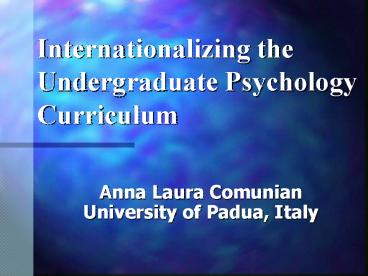Internationalizing the Undergraduate Psychology Curriculum
1 / 27
Title:
Internationalizing the Undergraduate Psychology Curriculum
Description:
The University's international policy and its results ... several documents have helped to establish a general cooperation policy. ... –
Number of Views:33
Avg rating:3.0/5.0
Title: Internationalizing the Undergraduate Psychology Curriculum
1
Internationalizing the Undergraduate Psychology
Curriculum
- Anna Laura Comunian University of Padua, Italy
2
Within the general strategy for research
organisation, the institutional promoting
international research activities mostly focus on
the European Programmes for Research and
Development.
3
Since the First Framework Program for Research,
researchers at the University of Padua have taken
part in several European consortia in order to
carry out innovative research projects using
Community funds
4
This participation has increased steadily over
the years, as the awareness that scientific
exchanges at an international level has though
they may require significant funds, nevertheless
they offer good opportunities for improving the
quality of research.
5
To face the required new approach, an operational
unit was established under the supervision of the
Pro-Rector, who is in charge of the Relations
with the European Commission.
6
The University's international policy and its
results
7
According to its Statutes, the University of
Padua "promotes the furthering of culture founded
on universal values such as human rights, peace,
respect for the environment and international
solidarity"..
8
In this spirit, during the eight centuries since
it was founded, the University has developed and
cultivated its own trans-national relationships
9
Today the internationalization of the University
can be confirmed by the numerous scientific
cooperation activities in which it is involved
and that has been carried out with scholars from
foreign universities and individually promoted by
University teachers and researchers.
10
At an institutional level, the internationalizatio
n can be confirmed by the University's
significant participation to the European
Programmes concerning education and research, its
cooperation agreements with institutions in
developing countries,
11
its participation to the Italian Government's
university internationalization policies, its
participation to the activities of the Coimbra
Group (the network of historical European
Universities) and by the vitality of its many
bilateral agreements with foreign institutions.
12
All the recent Rectors have devoted much
attention to promoting international
relationships. Dedicated Pro Rectors and
co-ordinators collaborate with the International
Relations Service's administrative staff in order
to run the many existing programmes and projects
and to develop new ones.
13
In the area of international educational
exchange, several documents have helped to
establish a general cooperation policy.
14
its participation to the Italian Government's
university internationalization policies, its
participation to the activities of the Coimbra
Group (the network of historical European
Universities) and by the vitality of its many
bilateral agreements with foreign institutions.
15
- The main aims behind the strategy
- are
- to raise awareness of European (and today even
global) citizenship
16
- to respond to the positive perception that a
university is much more attractive for a
potential student, at any level, if it is really
international
17
- to improve the teaching/learning approaches used
at our University on the basis of fruitful
comparisons with our partners' methodologies - to bring together complementary resources in
research and education in order to develop joint
educational opportunities and to further higher
level education.
18
Italian universities currently recruit future
researchers and professors from among the young
people who have completed the doctoral
examination. In Italy the deep diversified
realities, especially among Northern-Center and
Southern, appear to influence the relation
between training system and work market.
19
the agreements (Sorbonne, 1998, and Bologna,
1999), which have now been signed by University
Ministers of 32 European countries, have created
a dynamic European context
20
In this European context a University must
demonstrate that it has a strong commitment to
the creation of a common European Higher
Education Area.
21
The so-called Bologna process is at the same time
stimulating and demanding, in terms of both new
initiatives and required resources.
22
In Italy, Psychology Faculties of the University
have reformulated their teaching strategies on
the basis of the new system rules, offering over
three-year degree courses
23
and postgraduate and specialization courses and
have arranged the Masters courses which may be
attended after the three-year degrees or after
the postgraduate courses.
24
An university as a changing world with training
at high qualitative and quantitative levels,
appears to be fostered both from the
international research EU programs design
25
to foster research collaboration and exchanges in
the work forces, are encouraging Italian
psychologists to found new identity into common
European perspectives.
26
This is a debate that continues
27
Thank you































